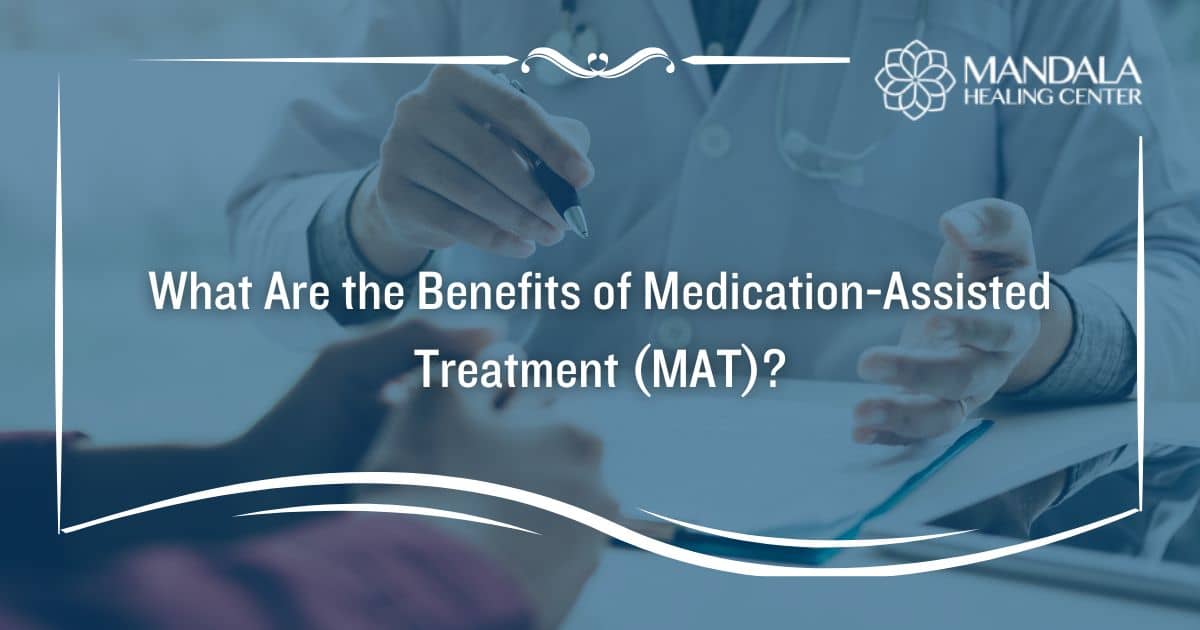Drug and alcohol addiction are conditions that impact every aspect of a person’s health and well-being. Chronic substance abuse can lead to physical dependence, relationship problems, lost opportunities, and many other life-altering challenges.
Comprehensive addiction treatment can allow people with addiction to identify and heal the roots of their substance abuse while learning the skills they need to avoid relapse for the rest of their lives.
Medication-assisted treatment is often considered the most comprehensive form of addiction treatment because it provides effective relief from withdrawal symptoms and reduces the urge to use substances. Medication-assisted treatment, or MAT, is an essential aspect of whole-person treatment that offers the best chance at full recovery from addiction.
Reach out to the specialists at the Mandala Healing Center now to learn more about the benefits of medication-assisted treatment or to explore our holistic treatment programs.
What is Medication-Assisted Treatment (MAT)?
Medication-assisted treatment (MAT) uses prescription medications during substance abuse treatment programs. In a MAT program, people receive medicines in addition to behavioral therapies, holistic care, and group support.
Research shows that people who participate in medication-assisted treatment have better outcomes and are more successful at achieving and maintaining sobriety. Those with opioid or alcohol dependence often benefit the most from this comprehensive form of treatment.
What Medications Are Used in MAT?
Medication-assisted treatment has proven most effective for those living with alcohol and opioid addiction. Here are some of the medications commonly used in treating these conditions.
Medications for alcohol use disorders
- Naltrexone (Vivitrol, Reviva)
- Disulfiram (Antabuse)
- Acamprosate (Campral)
Medications for opioid use disorders
- Buprenorphine (Suboxone, Sublocade, Subutex)
- Naltrexone (Reviva, Vivitrol)
- Methadone
- Naloxone
The medications used in MAT programs relieve withdrawal symptoms, help to rebalance natural neurotransmitter levels in the brain, and block the pleasurable effects of opioids and alcohol. When used in combination with behavioral therapies and education, these medications can increase the likelihood that a person will be able to stop using addictive substances and avoid relapse in the future.
What Are the Benefits of Medication-Assisted Treatment?
Medication-assisted treatment is an evidence-based form of treatment for substance use disorders. Programs that utilize MAT offer a more comprehensive, holistic approach to addiction treatment and can tailor treatment to meet each person’s unique needs.
Medications must be used as part of a comprehensive program that also includes education, lifestyle changes, behavioral therapy, and ongoing support. Research shows that people who participate in MAT have better outcomes and experience unique benefits.
Here are some of the most significant benefits of medication-assisted treatment.
Fewer cravings
Cravings can be a distraction from progressing in your recovery. People in MAT programs take medications that reduce cravings, allowing them to focus on recovery and more easily avoid relapse.
More manageable withdrawal symptoms
Many alcohol and opioid withdrawal symptoms can make people feel miserable. Nausea, headaches, tremors, body aches, insomnia, and other uncomfortable symptoms can discourage people and increase the chances of relapse. The medications used in MAT programs reduce the severity of common withdrawal symptoms and keep people as comfortable as possible during detox and treatment.
Increased likelihood of completing treatment
Fewer cravings and less discomfort mean that you can stay focused on your treatment plan. People who stay comfortable during detox and treatment are more likely to remain in the program and stay sober afterward.
Reduced risk of overdose
A relapse–meaning returning to substance use after a period of abstinence–puts people at increased risk of a deadly overdose. The medications used in MAT programs can keep people from relapsing during detox or treatment.
Reduced criminal behavior
Addiction can change how people think and behave, leading them to engage in risky or criminal behaviors they wouldn’t normally consider when sober. Actions like driving under the influence, having unprotected sex, stealing, or sharing needles can have long-term, life-altering consequences for people with addiction. Effectively treating addiction and providing long-term healing can mean reducing criminal or dangerous behaviors.
Better birth outcomes
Pregnant people who are addicted to opioids often give birth to babies who are dependent on opioids. Newborns with neonatal abstinence syndrome may go through withdrawal after birth and face medical complications.
Opioid-addicted mothers who stop using these potent drugs while pregnant may have pregnancy complications, including premature labor, fetal distress, and miscarriage. Medication-assisted treatment allows opioid-addicted mothers to safely taper their use and avoid harm to their unborn babies.
Improved ability to find work
Medication-assisted treatment programs have the highest long-term success rates among all types of substance abuse treatment plans. Getting high-quality, effective treatment and maintaining sobriety allows people to integrate into society and find work. People in MAT programs are more likely to find a job and remain employed than people who do not receive this type of care.
Understanding the benefits of medication-assisted treatment can help you make informed decisions about your care or find treatment for someone you love.
Find Medication-Assisted Treatment (MAT) Now
If you or a loved one require substance abuse treatment or want to learn more about MAT programs in Palm Beach County, contact the Mandala Healing Center specialists today. The effective treatment you needs is just a phone call away. Take the first step of your recovery journey by calling now.












